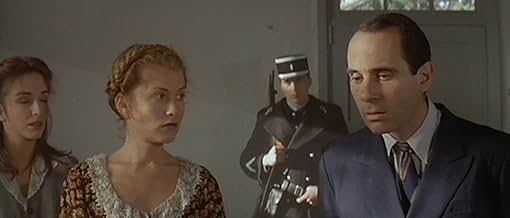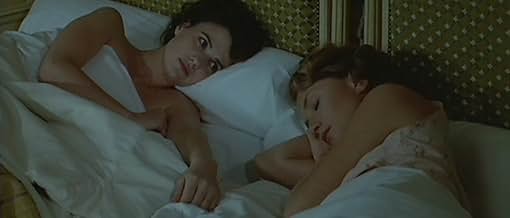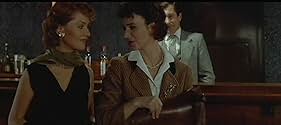अपनी भाषा में प्लॉट जोड़ेंA Jewish refugee marries a soldier to escape deportation to Germany. Meanwhile a wealthy art student loses her first husband to a stray Resistance bullet; at the Liberation she meets an acto... सभी पढ़ेंA Jewish refugee marries a soldier to escape deportation to Germany. Meanwhile a wealthy art student loses her first husband to a stray Resistance bullet; at the Liberation she meets an actor, gets pregnant, and marries him.A Jewish refugee marries a soldier to escape deportation to Germany. Meanwhile a wealthy art student loses her first husband to a stray Resistance bullet; at the Liberation she meets an actor, gets pregnant, and marries him.
- 1 ऑस्कर के लिए नामांकित
- 2 जीत और कुल 7 नामांकन
फ़ीचर्ड समीक्षाएं
Michel (Guy Marchand) falls in love with Jewish refuge Lena (Isabelle Huppert) at first sight and offers marriage as a way she can avoid being sent to a German concentration camp. She accepts, and although she doesn't love him, they have two children and are still married when we pick up the action again in Lyons in 1952 when Lena is 29-years-old. There she meets the sophisticated and well-to-do artist Madeleine (Miou-Miou) who awakens her to the drabness of her existence as a housewife with a loutish husband who now runs a gas station. The attraction between Lena and Madeleine is very strong, and very threatening to the men, especially to Michel.
Huppert's poignant and bittersweet portrayal reminds me of her delicate work in Madame Bovary (1991). There is the same listlessness expressed along with a vague desire for something better out of life, and the anticipation of the sadness that we know will come of such desire. Miou-Miou is sharp and cynical with perhaps a streak of the manic-depressive about her. The love they spontaneously feel for one another is real and beautiful and makes us want it to be fulfilled. But Lena holds herself back because of her family, and then it is the men and propriety that get in the way.
Of course this is very French and Lena and Madeleine hold hands and comfort one another while telling each other their innermost secrets including the infidelities of their spouses, etc. (The men have no such communication.) Director Diane Kurys exercises more restraint in showing the physical nature of their mutual attraction than would be displayed today. Lena says to Madeleine at one point, "I want to kiss you," but we do not see them kissing. The most explicit scene sexually is the startling, but delicately expressed, meeting with the soldiers on the train where we discover the full extent of Lena's frustration.
This is not quite a great movie. The pace is a little slow in spots and sometimes the focus is not as sharp as it could be. But it is an extraordinarily honest movie, and I'll take that over sharp technique any day. Huppert is not only at her best here, but her exquisite and subtle beauty is shown to great advantage. Miou-Miou is also very pretty of course--this is the first time I've seen her--so I would say her strength of character is perhaps her strongest suit. This is a human tragedy on a small, intimate scale, one that we can't help but feel could have been averted had those involved understood one another better, had they been a little wiser. We've all been there before and so we can share the sadness and the sense of loss.
The story of Lena and Michel may seem bizarre to North Americans--they meet and marry on the same day to escape deportation to the death camps--but it must have seemed quite understandable to the people who had to live through that madness. That Michel loves Lena passionately while she finds him dull and vulgar is also normal. These people are making-do with what they've been given, as are Madeleine and Costa, the other unhappy couple.
You either love or hate Isabelle Huppert--I must admit to the latter many times over the years, but Miou-Miou is worth whatever the rental or purchase price for this picture is: she's just wonderful; the smallest gesture of her hand carries so much meaning. One great scene has Costa, the world's worst businessman, bent over the sewing machine trying to add sleeves to shirts with only one sleeve that he's bought on the black market; Madeleine stands in the next room working at a sculpture, simultaneously trying to console Costa and quietly make him realize what a mess their lives have become.
It's a very nice feminist movie that doesn't make the men monsters -- they're just as bewildered with a world turned upside down as anyone else. Nonetheless, it's a pleasure to watch these two fine actresses give their performances as they come to understandwhat friendship means.
क्या आपको पता है
- ट्रिवियाThe movie is based on Diane Kurys' parents and the woman that came between them.
- गूफ़At the celebration following Liberation, the U.S. flag has 50 stars. At that time there would have been a 48-star flag.
- भाव
Lena Weber: [showing off a black cocktail dress] Do you like it? You don't? Madeleine lent it to me.
Michel Korski: She didn't dare wear it? Take it off at once.
Lena Weber: What's got into you?
Michel Korski: Know what you look like? It's so tight, I can see your panty line.
Lena Weber: [takes off her panties] There. No more panty line. Gone!
- कनेक्शनFeatured in At the Movies: Special Show: At the Cassette Store, Part 3 (1986)
- साउंडट्रैकSi tu Vois ma Mère
Music by Sidney Bechet
Performed by Sidney Bechet
Editions du Carrousel - disques Vogue
टॉप पसंद
- How long is Entre Nous?Alexa द्वारा संचालित
विवरण
- रिलीज़ की तारीख़
- कंट्री ऑफ़ ओरिजिन
- आधिकारिक साइट
- भाषाएं
- इस रूप में भी जाना जाता है
- Entre Nous
- फ़िल्माने की जगहें
- उत्पादन कंपनियां
- IMDbPro पर और कंपनी क्रेडिट देखें
बॉक्स ऑफ़िस
- US और कनाडा में सकल
- $39,74,975
- दुनिया भर में सकल
- $39,74,975
- चलने की अवधि1 घंटा 50 मिनट
- ध्वनि मिश्रण
- पक्ष अनुपात
- 2.35 : 1
इस पेज में योगदान दें





























